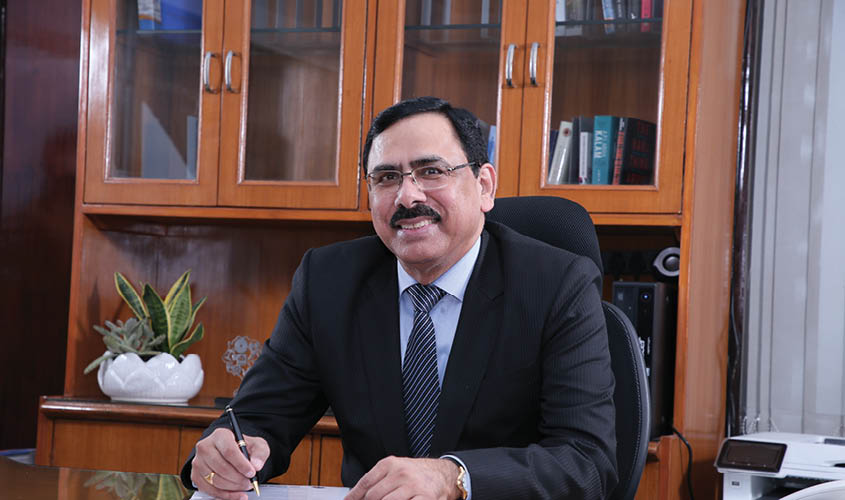SAIL chairman Anil Kumar Chaudhary says during lockdown, SAIL kept its essential equipment in running condition.
The nationwide lockdown in the wake of Covid-19 pandemic has brought the industrial activities to a grinding halt. The steel sector, in which India is on the second position after China in terms of crude steel production, is also badly impacted due to the crisis. There is a massive slowdown in the demand for steel. Keeping this in mind, public sector undertaking Steel Authority of India Limited (SAIL) has curtailed its production to 50% of the capacity. However, SAIL Chairman ANIL KUMAR CHAUDHARY, in an exclusive interview with The Sunday Guardian, says he is confident that post lockdown, the steel industry will bounce back vigorously on the back of strong demand from the construction and infrastructure sectors, which are bound to show robust growth. He also says that along with domestic demand, the prospects of steel exports are also quite promising. Excerpts:
Q: What will be the impact on the steel demand and production across the world and in the country due to lockdown?
A: Countries across the world had to go for lockdown as a preventive measure against the coronavirus to minimize its spread. However, this impacted the industries across sectors, including steel. The global as well as domestic steel industry is impacted by the outbreak of virus forcing steel producers to cut down on their production volumes. At this stage, it is rather difficult to assess the entire impact when everything is still away from being normal and India is executing the phased exit from the lockdown.
It is understood that during this period, the integrated steel producers have cut production to around half of their capacities owing to slack demand in the market. Operating below the rated capacities adversely affects the consumption of inputs, techno-economic parameters which has consequent impact on cost of production.
However, I am very confident that post lockdown, the steel industry will bounce back vigorously on the back of strong demand from the construction and infrastructure sectors, which are bound to show robust growth. In the recent roadmap given by Prime Minister Narendra Modi, he has mentioned that infrastructure is one of the five pillars of Atmanirbhar Bharat (self-reliant India). This will have positive impact on the domestic steel industry.
Q: How has it affected the production in SAIL plants?
A: During the time of lockdown, SAIL has kept its essential facilities and equipment in running condition with minimum manpower, after taking necessary preventive and safety measures, as steel is a continuous process industry and its complete closure is not practically feasible. Due to slowdown of demand, the Company has curtailed production to 50% of the capacity. Keeping in view the uncertainty about the time-frame of lockdown, SAIL preferred to have production of in-process material (popularly known as semis), which can immediately be rolled to make value added products as and when the markets improve. SAIL also utilised this period to prepone the scheduled capital repairs of the facilities, wherever feasible, as also to strengthen housekeeping of plants and installed facilities.
Q: How are you going to deal with the situation? Will the annual target of 2020-21 be impacted because of the current situation?
A: This financial year has just started and a lot can be done when there is a strong determination to achieve it. During lockdown, we have been operating our Plants at around 50% capacity. Post lockdown, we plan to enhance it to 75% level in the first stage and thereafter still at a higher level, synchronising with demand. As I said earlier, we are expecting major demand to come up post lockdown on the back of considerable spending on infrastructure and construction projects. In fact, the recent relaxation in lockdown by the Centre as well as many of the state governments coupled with announcement of massive stimulus package by the Prime Minister and the Finance Minister, has already shown positive impact on demand of steel in the last few days. We are ready to resume our normal working as and when the situation allows us. Along with domestic demand, the prospects of steel exports are also quite promising. We are already seeing increase in steel exports and SAIL is also participating in it.
Q: The lockdown also led to a large scale migration of labourers in the country. There are many contractual workers working in your steel plants. Will it affect the production in SAIL plants? How will you deal with the manpower crisis?
A: The labour migration issues will not impact the functioning at SAIL plants. The SAIL workmen and contractors’ workers engaged at our plants are based in and around our facilities. Apart from that, we have continuously been in touch with our workers’ union so that we can sustain the production flow and scale up production smoothly and quickly. The company values its manpower and is sensitive to the requirement of people working for it. We have ensured safety measures, including social distancing inside plants and shop floors as well as in the areas around the plants so that our workmen are safe while they maintain social distancing.
Q: Will the ongoing crisis affect the SAIL employees in terms of salaries, bonus and other emoluments?
A: No. During all the months, salaries to the employees have been paid exactly in time. I will reiterate that SAIL is regarded as a model employer and has always been sensitive to the employees’ expectations. Ours is a pro-employees’ company.

